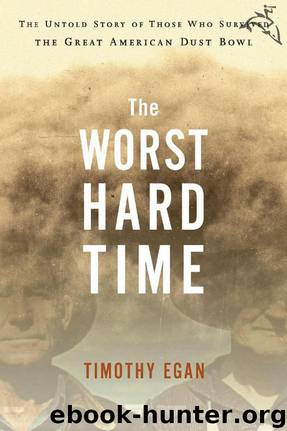The Worst Hard Time by Timothy Egan

Author:Timothy Egan
Language: eng
Format: mobi, epub
Publisher: Houghton Mifflin Harcourt
Published: 2011-05-20T16:23:46+00:00
Boise City, Oklahoma, April 1936
The Ehrlichs tried grinding up thistle for cattle feed, but it did not seem to work as it did for the Lowerys; their stock herd was thinning, unable to sustain itself. Newborns came out sickly and small. For Willie Ehrlich, the only surviving boy from a family of ten, who was trying to build a life by following in his father's footsteps, the calves were his future. But he could see at birth that the animals would not live, that they looked half-formed, sickly, not ready for life. Sometimes, it made him cry to kill his calves at birth, using the blunt end of an axe to crush their heads. He was married, with two children of his own, still living with his parents on the homestead the Ehrlichs had acquired in 1900 after getting off the immigrant train. The travails of his father, George, fleeing the czar's army in Russia, surviving that typhoon at sea, and living through the cold hatred of people who thought all German Americans were suspect, gave Willie and his father enough faith they could crawl through this long hole of dirt and depression. The Ehrlichs had established themselves with a typical homestead—160 acres, a quarter-section big enough for cows, a garden, hogs, a few rows of oats, and some wheat. Nearly all of it was gone, reduced to a barren patch in the dun-colored air around the Texas-Oklahoma border. They lived on what they could make and store. After killing a hog, they would trim off the fat and use it for canning gel or mix it with lye to make soap. The meat was salted and rubbed with a solution of brown sugar and brine. They would let it dry for weeks, hanging from the windmill, then rub it again in salt and sugar, injecting the solution near the bones with a syringe. It would go into a bag and hang in the basement for months. They ate everything but the squeal.
Ehrlich's neighbor, Gustav Borth, did not have even a hog to slaughter for his winter sausage, or cow chips for fuel. He borrowed twenty-five dollars from a bank—pledging part of his homestead and his combine to buy coal for his stove. A proud man, descendant of a line of Germans who prospered after Catherine the Great opened Russia to them, Borth was crushed by the America of 1934. Deeply homesick and disillusioned, Borth would go behind the shed of his farm, trying to hide from his family, and there he would cry. His daughter, Rosa, saw him several times as he wept; he was hunched over, the tears pouring out of him. It broke her heart. He sold the last of his cattle to the government for seven dollars a head. With this money, the children wanted shoes. Rosa Borth, age fourteen, had only a single pair, and she had outgrown them. She painted them black for church, white for school. When the weather was warm, she went barefoot.
Download
This site does not store any files on its server. We only index and link to content provided by other sites. Please contact the content providers to delete copyright contents if any and email us, we'll remove relevant links or contents immediately.
Man-made Catastrophes and Risk Information Concealment by Dmitry Chernov & Didier Sornette(6019)
The Revenge of Geography: What the Map Tells Us About Coming Conflicts and the Battle Against Fate by Kaplan Robert D(4077)
Zero Waste Home by Bea Johnson(3839)
COSMOS by Carl Sagan(3625)
Good by S. Walden(3558)
In a Sunburned Country by Bill Bryson(3542)
The Fate of Rome: Climate, Disease, and the End of an Empire (The Princeton History of the Ancient World) by Kyle Harper(3067)
A Wilder Time by William E. Glassley(2863)
Camino Island by John Grisham(2798)
Organic Mushroom Farming and Mycoremediation by Tradd Cotter(2692)
The Ogre by Doug Scott(2683)
Human Dynamics Research in Smart and Connected Communities by Shih-Lung Shaw & Daniel Sui(2501)
Energy Myths and Realities by Vaclav Smil(2493)
The Traveler's Gift by Andy Andrews(2461)
9781803241661-PYTHON FOR ARCGIS PRO by Unknown(2372)
Inside the Middle East by Avi Melamed(2357)
Birds of New Guinea by Pratt Thane K.; Beehler Bruce M.; Anderton John C(2255)
A History of Warfare by John Keegan(2244)
And the Band Played On by Randy Shilts(2209)
